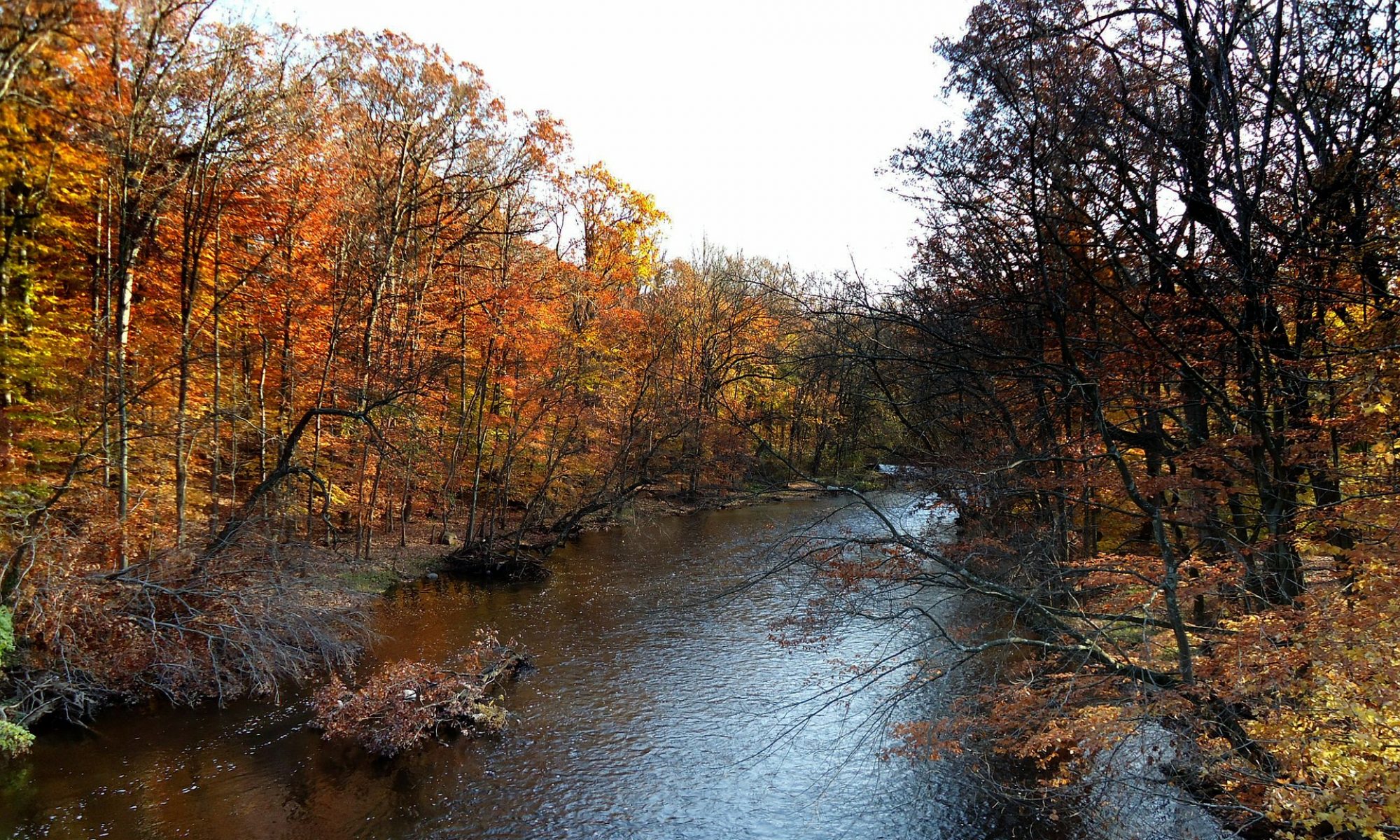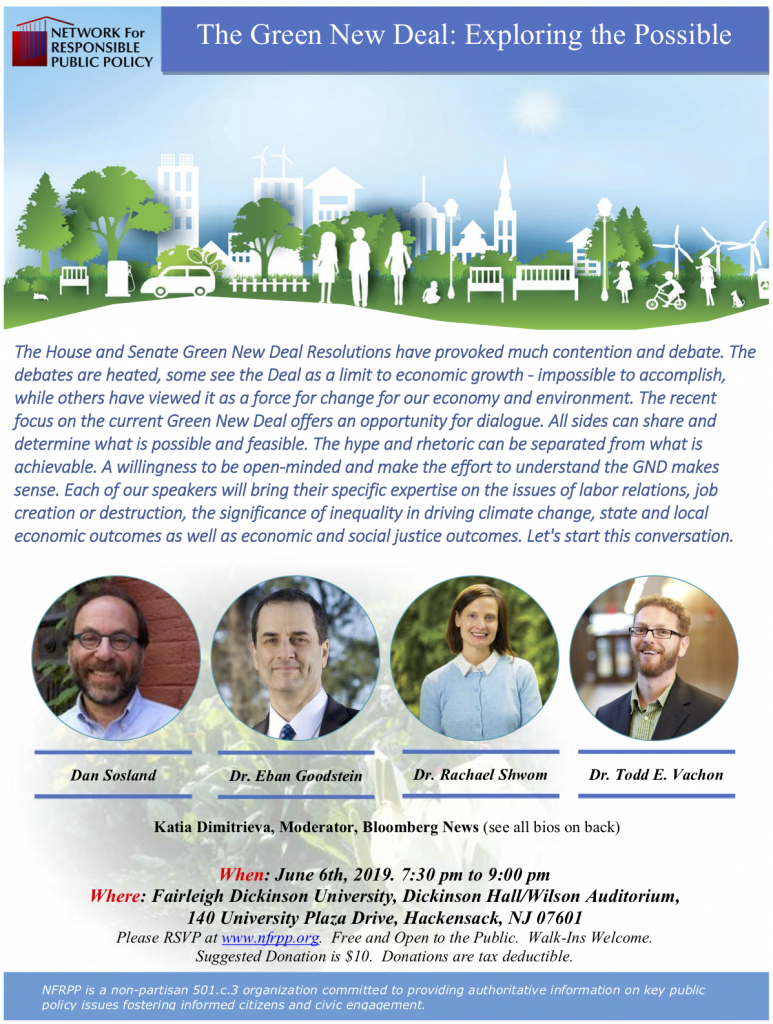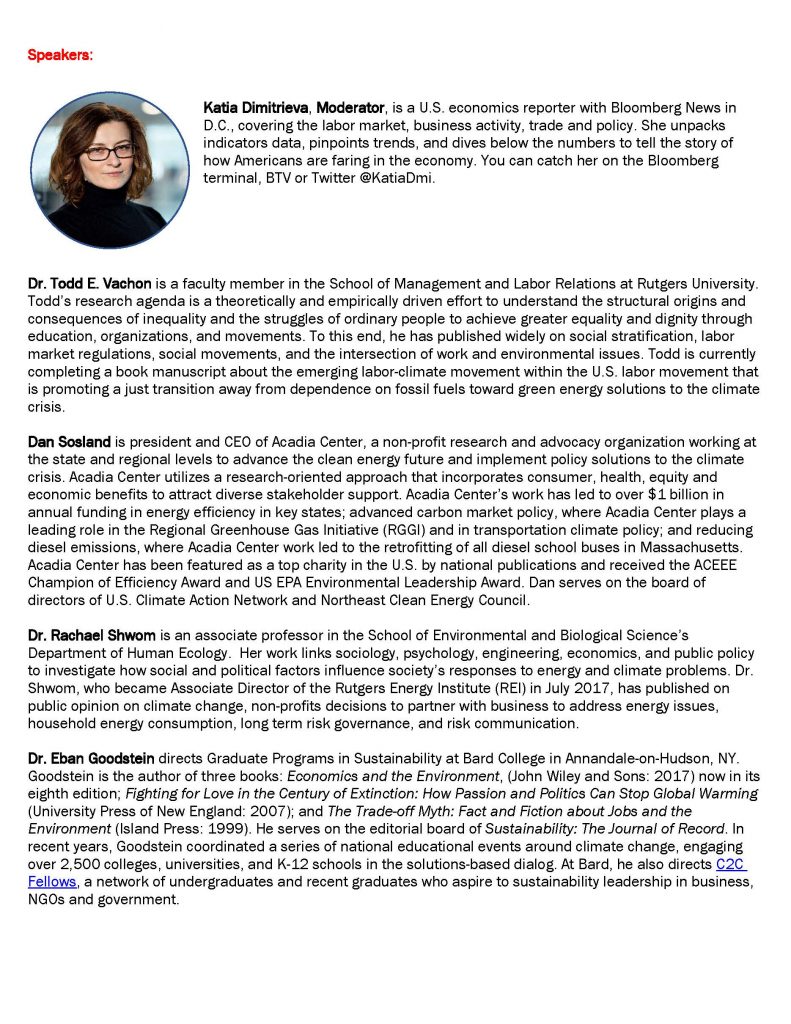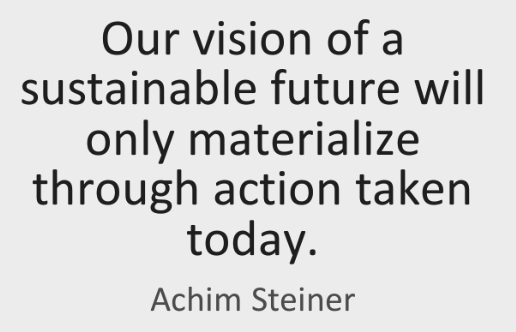The Network for Responsible Public Policy is sponsoring a discussion of the Green New Deal at Fairleigh Dickinson’s Metro Campus in Hackensack on June 6, 2019 (7:30-9 pm). Please RSVP at www.nfrpp.org. Click to download flyer.
New Jersey Now “Gets” Climate Change. What We Are Still Missing: A Climate Vision for Montgomery County, Maryland: Should We Be Doing This in New Jersey?: Part 6
Montgomery County, the most populous county in Maryland, was recognized today – Day 1 of the International Decade for Emergency Climate Action – by President Alexandria Ocasio-Cortez, Congress and the United Nations as the first Post Carbon(P-C) community in the United States and the largest jurisdiction on the planet to reduce its net Greenhouse Gas (GHG) emissions to zero, while also removing millions of tons of GHGs from the atmosphere.
The county government in partnership with its one million residents achieved this ‘moonshot’ goal through the transformation of its energy, transportation, building and agricultural systems, while strengthening the ability of its residents and businesses to withstand the increasingly frequent and severe physical and socio/economic shocks resulting from accelerating climate change.
Join me as I share how Montgomery – a wealthy, highly diverse, well-educated majority-minority community [2] – got to be a P-C community and what it now looks like. Continue reading “New Jersey Now “Gets” Climate Change. What We Are Still Missing: A Climate Vision for Montgomery County, Maryland: Should We Be Doing This in New Jersey?: Part 6”
The Green New Deal is Now Every State’s Call to Action
Bringing the Green New Deal home
Writing in the Janesville, WI GazetteExtra, John Imes writes:
The Green New Deal resolution introduced in Congress calls for a massive U.S. mobilization over 10 years to achieve the goal of net-zero greenhouse gas emissions while creating millions of high-wage jobs and sustainable economic growth. Unfortunately, while the science and need for federal action on climate change are clear, we can’t expect serious policymaking on the topic to come out of Washington until 2021 at the earliest.
Fortunately, it’s a new day in Wisconsin and the state is well positioned to make headway on many of the goals and objectives as outlined in the Green New Deal. For example…
Well, it’s also a new day in New Jersey, and indeed in every other state, and since we’re here, let’s do the comparison.
Continue reading “The Green New Deal is Now Every State’s Call to Action”
New Stormwater Fees the Perfect Opportunity for PACE
[Reposted from NewJerseyPACE.org]
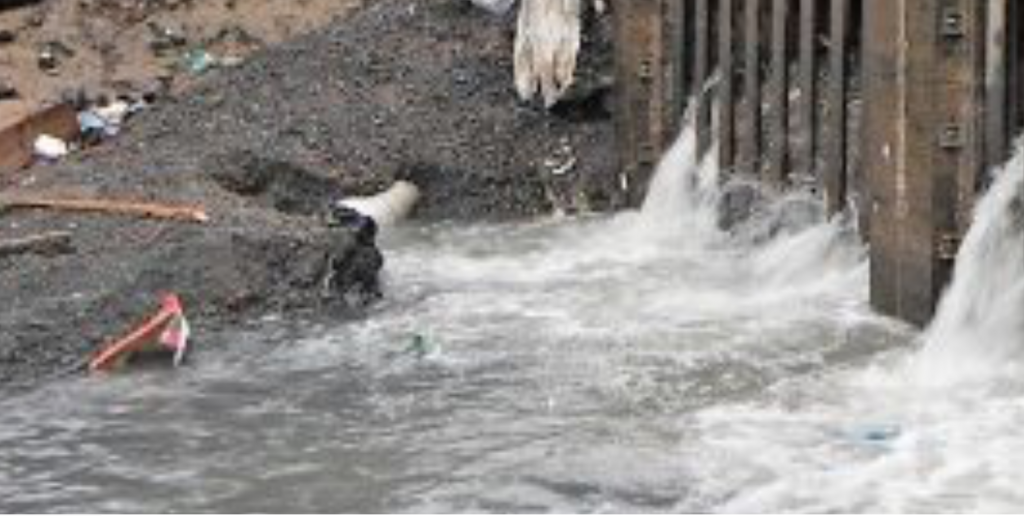
February 14, 2019: NJ’s new stormwater utility bill (A2694/S1073) authorizes municipalities to collect fees on parking lots and other impervious surfaces to fund improvements to failing stormwater systems. But it has many commercial property owners concerned that they will now face significant new charges on their property. If the legislature and the Murphy Administration want to address these concerns in a meaningful way, PACE (Property Assessed Clean Energy) is the obvious answer.
PACE can provide 100% long-term financing for projects designed to reduce stormwater runoff by building retention systems, green roofs, and permeable paving. These improvements add to the value of the property and allow the owner to avoid some or all of the fees likely to be charged by the new utilities. When coupled with other clean energy and resiliency improvements, PACE projects are typically cashflow positive from day one. The capital is invested in the property by private lenders, but is off-balance sheet to the property owner, and the interest and other costs can often be treated as operating expenses. There is no public money involved. The municipality simply makes the Special Assessment mechanism available to the property owner, and provides a pass-through for the repayments.
Continue reading “New Stormwater Fees the Perfect Opportunity for PACE”
New Jersey Now “Gets” Climate Change. What We Are Still Missing: Focus State Support for a Carbon Tax at the Federal Level: Part 5
By Mike Aucott[1]

The idea of putting a broadly-applied price on carbon dioxide emissions from combustion of fossil fuels from all major sectors of the U.S. economy is gaining traction. Several national organizations are actively supporting a carbon tax, including Citizens’ Climate Lobby[2], the Climate Leadership Council[3], the Carbon Tax Center[4], and PUTAPRICEONIT[5].
A number of nations and other jurisdictions already have some form of carbon pricing. A group of Princeton University students, the Princeton Student Climate Initiative[6], is exploring ways to strengthen New Jersey’s effort to cut greenhouse gas emissions, including development of a state-level carbon tax.
While state-level programs to price carbon could be effective, carbon pricing approaches will be more effective if they are national and, ideally, international in scope.
Green Economy Podcasts — New!
Jim Cox

We recently came across a series of podcasts by our personal Financial Advisor, Jim Cox. Jim focuses on sustainable investments, but we had no idea he was actively interviewing experts and activists from across the country on a variety of topics related to the emerging green economy. Jim writes, “Sometimes it feel like I’m a voice in the wilderness…” which led us to the idea of posting his podcasts for a wider audience.
James Cox is a financial advisor with FFG Advisors. He focuses on wealth and risk management for clients of the firm. He is on the board of several organizations. James joined FFG/DFP in January of 2012. Many of Mr. Cox’s clients are entrepreneurs and business owners. His practice helps individuals manage risk within their finances, even as they are striving toward creating successful companies. To learn more go to http://jamesacox.com.
The first one that came to our attention was the conversation with Janet Kirsch, a physician and public health specialist, who is devoting her life to climate mobilization.
Mobilizing for Climate Disruption (September 21, 2018)
Janet Kirsch is a physician and speaker with 350 Bay Area. We had initially talked days before hurricane Florence made landfall. We chat today about the need to approach climate disruption with increased vigor and commitment.
And here are some other selected podcasts from James Cox, available on iTunes and elsewhere.
New Jersey Now “Gets” Climate Change. What We Are Still Missing: Why We’re Not Talking About What We’re Not Talking About: Part 4
By Matt Polsky

Image by Claire Bryden[1]
Introduction and Importance
Why are we not talking about the things we don’t usually talk about that need to be involving climate change? Why is it so hard to talk about or hear certain things like a carbon tax, a zero carbon emissions goal, or the many other steps we can or may have to take to address this immense problem, or it’s taking decades which we no longer have?
Mindset barriers or traps are a big part of the reason. They overlap to various degrees with many other concepts, such as world view, mental models, obsolete paradigms, cognitive biases, cognitive sticking points, blind spots or blinders, myths, ideology, stories, narratives, unquestioned assumptions, dogma, mantras, emotionalism, faith, group think, and certitudes. Some of these can have a positive or neutral side, or are necessary in some way.
We also can include unquestioned beliefs about business-as-usual practices—and not just in business, or “that’s just the way it is” shrugs. In certain contexts we can add references to someone’s “mentality,” “psychology,” “temperament,” or “the way the person is wired.” There are also language, framing, and communications issues.
New Jersey Now “Gets” Climate Change. What We Are Still Missing: “From Government and Really Helping”: Part 3
By Matt Polsky

Photo by Army National Guard/Lt. Zachary West
The first two articles of this Series, see here and here, discussed ideas and gave recommendations about opportunities to address climate change about which we’re not hearing enough of in New Jersey. We continue to provide more of these in Part 3.
Two historians of science, Oreskes and Conway, responding recently to the latest IPCC report, and invoking the “transformation” concept, both discussed in Part 2, tell us that “Major transformations can happen in a generation. But not without government help.” So, we’re going to have to talk about State Government yet again, because it is that important.
They also rebut the conventional wisdom that the technological advancements many are counting on to address climate change are going to come solely from the private sector.
What We Need to Do Now about GHG Emissions in New Jersey

By Jonathan Cloud
Over the past several decades, scientists have warned us that we need to curtail further greenhouse gas emissions if we wish to keep global warming below 2°C, which many consider a major danger limit for the Earth’s climate. The latest IPCC Special Report suggests that our economy must undergo a series of rapid transformations if we are to have a chance of staying at or below 1.5°C, and going over that could have disastrous consequences for many millions of people. The global emissions trajectory we are on is clearly incapable of even slowing the rate of temperature growth and sea-level rise, and must be reduced dramatically if we are achieve even a modest extension of the time we have before the Earth hits another milestone and potential tipping point.
Both U.S. and NJ emissions have been declining since the early 2000s, and NJ actually hit its 2020 goal of bringing emissions down to 1990 levels by 2008. But reaching the next set of objectives, an 80% reduction by 2050, will be significantly harder. According to a 2017 Rutgers report, “meeting the state’s limit of an 80 percent reduction from the 2006 level by 2050 will require a 75 percent reduction from 2012 emissions.”[1] The UN estimates that global emissions overall must be trending firmly downward by 2020 (just over a year away) if we are to have any hope of staying “well under the 2°C limit,” which is the language of the Paris Accord.
Continue reading “What We Need to Do Now about GHG Emissions in New Jersey”
Finding the Green in Murphy’s ‘Economic Master Plan’
New Jersey’s new “economic development master plan” is embedded in a report issued by the NJ Economic Development Authority titled “The State of Innovation: Building a Stronger and Fairer New Jersey.” First accounts of the report, such as this one from NJBIZ, mentioned a focus on wage growth, on community college education, on innovation, and on streamlining regulations for small business, but did not specifically mention that clean energy is a major part of the “innovation” focus.
Gov. Phil Murphy announces his major economic agenda on Oct. 1, 2018 at ON3 biotechnology campus in Nutley. – (EDWIN J. TORRES/NJ GOVERNOR’S OFFICE)
Gov. Phil Murphy on Monday unveiled his “master plan” aimed at reimagining how the state attracts and keeps jobs and businesses and kick starting New Jersey’s economy, which he said lagged for the past decade under the administration of Chris Christie.
Murphy, at the ON3 biotechnology campus in Passaic County, said his goal is that by 2025 New Jersey will have added 300,000 new jobs, achieved a 4 percent wage growth or an increase of $1,500 in median wages, 40,000 more women and minorities working in STEM fields, $645 million in new venture capital investment, and the employment of 42,000 more women and minorities.
More broadly, Murphy’s economic outline has four parts – investment in people, investment in communities, a build-up of the innovation economy and making government work better for small businesses by streamlining much of the permitting and application processes and bureaucracies online.
Continue reading “Finding the Green in Murphy’s ‘Economic Master Plan’”
